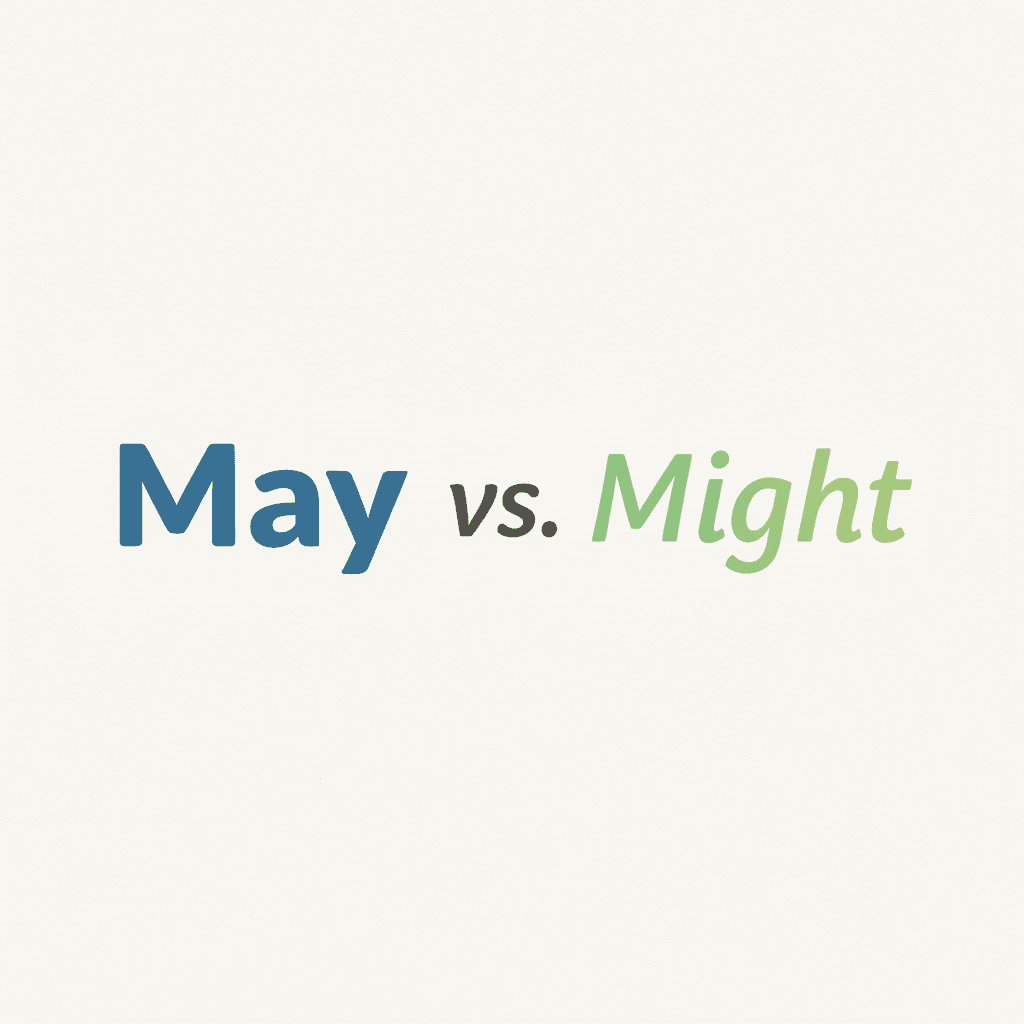May vs. Might: What’s the Difference?
 Both may and might express possibility, permission, or uncertainty, but they differ slightly in meaning and tone.
Both may and might express possibility, permission, or uncertainty, but they differ slightly in meaning and tone.
Here’s the quick rule:
- May → stronger possibility or permission ✅
- Might → weaker possibility or something more uncertain 🤔
1. May: Possibility or Permission
Meaning
“May” is used to express something that is possible or allowed.
It suggests a real or likely chance of happening.
Examples (10 total)
- It may rain later today.
- You may start the exam now.
- We may visit London this summer.
- The results may surprise you.
- She may come if she finishes early.
- Students may not use phones in class.
- This app may not work on older phones.
- I may call you tomorrow to confirm.
- He may already know the answer.
- You may park here after 6 p.m.
🧠 Tip:
If you can replace it with is likely to or is allowed to, use may.
“You may go” = “You are allowed to go.”
2. Might: Weaker Possibility or Hypothetical
Meaning
“Might” is used to show a smaller chance or a more uncertain possibility.
It’s also used to describe imaginary or hypothetical situations.
Examples (10 total)
- It might snow tonight.
- She might join us if she feels better.
- We might see a movie after dinner.
- He might have been joking.
- They might not know the truth.
- I might go to the party — not sure yet.
- If I had more time, I might travel abroad.
- She might have missed the call.
- That might be the reason for the problem.
- He might not agree with your plan.
🧠 Tip:
If you’re unsure or imagining something that hasn’t happened, use might.
“It might happen” = less certain than “It may happen.”
3. Quick Comparison Table
| Use | May | Might |
|---|---|---|
| Certainty | More likely | Less likely |
| Permission | Yes (“You may leave.”) | No (not used for permission) |
| Politeness | Formal | More casual |
| Hypothetical past | Rare | Common (“might have…”) |
| Example | It may rain later. | It might rain later. |
4. May for Permission vs. Might for Possibility
- May → used to give or ask permission.
- Might → never used that way.
✅ May I borrow your pen?
❌ Might I borrow your pen? (Sounds overly formal or old-fashioned)
✅ You may go now.
❌ You might go now. (Incorrect for permission)
5. May Have vs. Might Have
Both forms talk about past possibilities, but they differ slightly in certainty:
- May have = a real or likely past possibility.
- Might have = a weaker or hypothetical one.
Examples:
- She may have left early. (We think she probably did.)
- She might have left early. (We’re not sure — just guessing.)
- If I had known, I might have helped you. (Imaginary situation)
6. How to Remember
👉 May = permission or real possibility.
👉 Might = imagination or small chance.
💡 Memory Trick:
May feels more confident.
Might sounds more doubtful.
7. Common Mistakes
❌ You might go now.
✅ You may go now. (for permission)
❌ It may snow yesterday.
✅ It may have snowed yesterday.
❌ If I studied more, I may pass.
✅ If I studied more, I might pass.
8. Why It’s Confusing
In modern English, may and might often overlap.
For example, both are correct in:
“It may rain” or “It might rain.”
The difference is tone — may sounds slightly more likely or formal, while might sounds more cautious or speculative.
Even advanced writing tools like Humanizey can detect subtle context clues to decide which modal verb fits best — especially in essays, dialogue, or formal writing.
FAQs
1. Can “may” and “might” mean the same thing?
Yes, often — especially when expressing general possibility (It may/might rain later.)
2. Is “might” past tense of “may”?
Historically yes, but in modern English, both are used for present or future possibility.
3. Which is more polite — “may” or “might”?
Might can sound softer and more polite in requests (Might I ask a question?), though it’s rare today.
4. Can I use “may” with “have”?
Yes — may have expresses a past possibility: He may have missed the call.
Practice: Choose the Correct Word (“May” or “Might”)
(Answers are listed at the end.)
- It ___ rain this afternoon.
- She ___ not come to the meeting.
- You ___ leave when you finish your work.
- I ___ go out later, but I’m not sure.
- If I had known, I ___ have called you.
- The teacher said we ___ use calculators.
- He ___ already be at the airport.
- This plan ___ actually work!
- I ___ go to the concert, but tickets sold out.
- You ___ want to check that again.
Answers
- may / might (both OK)
- might
- may
- might
- might
- may
- may
- may
- might
- might
